It’s James Dean’s birthday. In 2013, a restoration of Rebel Without a Cause had a short theatrical run. I saw it at the Film Forum and wrote the following piece.
I first saw Rebel Without a Cause when I was the general age of the main characters. Although I was far removed from its 1950s context, the film expressed to me what life felt like, as I was living it. My parents loved me and supported me, I had friends, and hobbies I enjoyed. But I was an intense and sensitive child, a sponge to the influences upon me (mostly from literature and film). The sense of yearning that comes with being a teenager, the "divine dissatisfaction" (to quote Martha Graham) which gives even pleasing things a poignant ache, reaches its high baroque stage in Nicholas Ray's Rebel Without a Cause. The film is baroque to the point of decadence, drenched in symbolic colors, and images evocative of the crucifixion and resurrection (the whole thing takes place on Easter weekend). Rebel mainlines into the mother lode of anxiety and frustrated sexuality in adolescents, at the mercy of their hormones and lack of experience, a world where "This too shall pass" has no meaning.
When Rebel Without a Cause was first released, it was touted as almost a sociological study of Juvenile Delinquency. There were lots of teenagers hanging around with nothing to do but get up to no good. It was a new era of prosperity, kids had money in their pockets, and “teenagers” began to take on an awful shape in the public mind, threatening to the grownups due to the force of demographics. Elvis Presley was already starting that seismic shift down South when Rebel arrived in theatres, and while he wouldn't explode to national prominence until 1956, the process was well on its way. There had been other harbingers: movies like The Wild One (1953), with Marlon Brando's famous rejoinder to the question, "Hey Johnny, what are you rebelling against?": "Whattya got?"
Newspapers and preachers and teachers-associations agonized over what could be afflicting the nation's pampered youth. It was also an era of tremendous conformity. Sylvia Plath's The Bell Jar is an opus to what institutional societal conformity can do to the individual (Janet Malcolm called the book an “indictment of the fifties”). It is true that one cannot exactly point to the problem. It is insidious, pervasive, Big Brother-ish in nature, and, frankly, delusional. Lester Bangs touched on this in his famous Village Voice obituary for Elvis, where he gets at just what Elvis toppled:
Lenny Bruce demonstrated how far you could push a society as repressed as ours and how much you could get away with, but Elvis kicked “How Much Is That Doggie in the Window” out the window and replaced it with “Let’s fuck.” The rest of us are still reeling from the impact.
Rebel Without a Cause works with or without the surrounding context. I had no idea the context when I first encountered it as a teenager. One thing I did know is that its young star, James Dean, died one month before its release. The impact of his death was seismic. Martin Sheen describes the lost feeling he got when he heard the news as a young aspiring actor: who was there to look up to now? Elvis cried when James Dean died. Already, with his debut in East of Eden, James Dean made an electric impression. And, creepily, the films kept coming after he passed: first Rebel, then Giant, Dean's power resonating from beyond the grave. Dying young is a sure way to ensure immortality, but "dying young" cannot fully explain the impact Dean's acting had on the youth of the time. It existed before he died. This is important to keep in mind. His death just intensified what was already there.
There is a haunting quality to Rebel, overall, a strangeness that makes it far more than a worried presentation of What Is Wrong With Kids Today? or a hot vehicle for the hottest new star of the day. Rebel is not literal in any way, shape, or form. It doesn't feel "ripped from the headlines" the way other films addressing similar topics at the time did. Instead, it tiptoes through a bombed-out landscape of existential dread and fatalism, a doom-ridden end-of-the-world awareness licking at that generation's heels, haunted by the revelations of Hiroshima and Nagasaki. Like Hamlet, another existential worrier, the kids in the film feel life is "weary, stale, flat, and unprofitable", baffling their parents, who grew up in the Depression, fought in the war, what on earth do these kids have to whine about? Well, they grew up knowing mankind had its finger trembling on the button of destruction. What does anything matter anyway if some madman on the other side of the globe could push a button and vaporize us in moments? This consciousness seeps through Rebel like an invisible poison gas, inhibiting people’s relationships to one another, throwing up barriers in our attempts to connect. I mean, look at the framing here, in the first scene.
The three lead characters are all present in the frame, but there are barriers between them (and between us, we can't see some of their faces). And yet the way they are placed in the frame connects them, almost against their will.
Jim (James Dean), Judy (Natalie Wood), and Plato (Sal Mineo) are not kids from the wrong side of the tracks, and this is by design. There is no easy diagnosis for what ails these three (and it’s different for each of them). You can't point the finger at what is wrong. The best you can do is make a large gesture at the whole world - school, parents, authority figures - and say, “I didn’t make up these rules, and these rules are literally suffocating me.” Rebel Without a Cause is dark enough to suggest that what is wrong is how our culture is set up in the first place, the premium it puts on fitting in, the brutality with which it treats outsiders, and its pitilessness towards those who can’t play by the arbitrary rules. Rebel is bold enough to acknowledge the uncomfortable reality that what is wrong doesn't ultimately matter in the grand scheme of things. We are all made up of star dust and to star dust we will return. We are a blip on the radar screen of the universe. Perhaps being kind to one another does matter (as Jim's kindness to Plato shows), but it doesn't alter the course of events, it doesn't change a damn thing. The film is a hopeless vision, something I didn’t quite perceive when I saw it the first time as an adolescent, but came shrieking off the screen to me in the clearest of tones as an adult. In this context, the most important scene in Rebel is the field trip to the planetarium, where our three heroes are confronted with the end of the world presented in a flashing light show, meant to shock and awe, or perhaps instill a little humility, give the kids perspective of their proper place in the scheme of things. Each character reacts differently, but all are deeply unnerved by the experience. They are not yet bonded together, but they have a shared experience, staring up at the artificial sky.
The school thug, Buzz (Corey Allen, excellent), responds to Dean’s Jim Stark in what is obviously a sexually-threatened way, part of the homoerotic thrum of almost every male interaction in the film. Jim, as played by Dean, has a quiet kind of power, and people project things onto him. Hopes, desires, resentments … all get poured at Jim Stark like a wave. It happens in every scene. It’s indiscriminate. He's different, he's quiet, he's beautiful. People react to beauty in strange ways sometimes. We desire it, we want to merge with it, we are envy of it, we want to crush it. Simultaneously. The film doesn't shy away from this. The film doesn't pretend James Dean isn't as good-looking as he is. Every shot, every frame, is chosen to highlight his good looks in what amounts to blatant objectification. Buzz feels it. Buzz is top dog, he has to lash out at it. Buzz cracks, "Oh he's real abstract. He's ... he's different." Jim speaks out Buzz’s subtext, daringly: "That's right. That's right. I'm cute too." Things come to a head between Buzz and Jim during the knife fight at the planetarium. The air crackles with hostility. Jim shows up for the chickie run wearing his red jacket. The two young men inspect the cars for the race. The energy has shifted. The rest of the crowd are teenagers, still kids. These two are men. They've outgrown the scene in which they are leaders. But they don't know what "being a man" means. Their fathers have not taught them. They have to make their own world, their own rules, because the men in their lives have failed them. Buzz and Jim, exhausted from all the drama, talk to one another quietly, looking over the edge of the cliff.
Buzz: You know something? I like you.
Jim: Why do we do this?
Buzz: You've gotta do something. Don't you?
This may very well be the most important exchange in the film. Even with the stench of nihilism and fatalism seeping through the action, there is a doomed hope of connection. But it is, indeed, doomed. (A lesser film would not have developed Buzz in the way that Rebel does.)
It cannot be overstated just how overwhelming James Dean is on the big screen. I have seen all of his films in the theatre and it's something I recommend, if you can swing it. He still feels fresh. He’s spontaneous. Playful. Fearless with his body. His may have been a tenuous talent, emanating from neurosis or some sort of "sick"-ness (Elia Kazan’s take, having experienced Dean first-hand on East of Eden). Marlon Brando thought Dean was good but lacked discipline and got in his own way. All of it was probably true. Dean was young. He was 24 years old when he died. The "what if" hovering around Dean can sometimes take away from the sheer fascination of what he was able to accomplish while he was alive. Seek out his live-television appearances on YouTube. He’s riveting. You have to almost get the James Dean Myth out of the way, the best you can, in order to actually perceive him at all. Seeing him in a dark theatre on a big movie screen is a great way to do it, because his authenticity is undeniable. I have seen Rebel so many times I know it by heart. Back in the day, I held up a tape recorder to the television, so that I could listen to it and "re-live" the movie in my head. Listen, Gen-Xers had to get creative like that in the years before VCRs. So I know every grunt, pause, aside in the film. And still, still, I find moments that surprise me, moments that may be well-known but never lose their power.
Like rolling the milk bottle around on his face (a spontaneous choice by Dean), and punching the desk (he actually broke his hand), and giggling when the cop frisks him. There’s the famous opening scene where he drunkenly falls into the frame.
It’s there in subtler moments, too. The way Jim seems to understand the nature of Plato's love for him, and he doesn’t recoil. Jim’s understanding makes him even more kind. The look of pain flashing into his eyes when he sees his father (Jim Backus, wonderful) on the floor, in an apron, worriedly picking up spilled food. The beautiful scene with the sympathetic police officer, the man-to-man talk over the water cooler, when Dean really seems to be taking in what the police officer has to say. Dean’s beauty adds to his almost overwhelming effect as an actor. He's a movie star.
One of the things Dean does so well is to naturally combine a brooding interior energy with an extroverted sense of action and objective. His acting wouldn't be the same without that blend, if he privileged one over the other. The interior energy is the sense he is always thinking, contemplating, musing, on a plane that has nothing to do with the script. Dean never ever forgets to play the subtext. The sense of action and objective makes him thrilling and important as an actor, the way he kisses Judy gently on her temple, the way he covers Plato up when he is sleeping, the way he manhandles his father. In the latter example, Dean does not forget that Jim’s primary emotion is grief, not rage. And when he puts on the red jacket for the chickie run, you feel the thrill of danger. He looks so startling, so glamorous. It's a warning signal, a red flag, a rejection of the tweed-jacket-loafers "costume" he wore in earlier scenes. A rejection of everything.
Judy’s rampant sexual confusion was seen as so explosive that the studio execs worried about some of the implications. For example, what the hell was actually going on with her father? Fathers are key to Rebel. Mothers are irrelevant. They are either scoldy-pants nonentities, or irresponsibly invisible. Fathers have shirked their responsibility. Their children are growing up broken. Sex is the radical subversive underpinnings of Rebel, and yet acknowledged only from the side, as though the film is almost afraid to speak out loud what’s on its mind: sexual politics in suburban homes, the threat of incest, what it means to a father to see your child - especially a daughter - blossoming sexually. Judy's father rejected her once she started adolescence. He no longer gives her affection, he no longer kisses her, and he shames her for the fact that she is becoming a woman. When she tries to kiss him at the dinner table, he explodes. She's too old for all that now. Old for what? Being loved by her father? By rejecting her, he throws her to the wolves of her peers where she will now strut and pose and "act out", looking for acceptance in the form of sex. Easy enough with teenage boys. Judy doesn't want sex, not really, she wants acceptance and tenderness. Having a 16-year-old daughter suddenly sprouting breasts and wearing lipstick is, of course, potentially disturbing for a parent. You want to protect your child. You don't want to be inappropriate. But a daughter becoming a woman is the natural order of things, and she should not be shamed for it. Judy's parents fuck it all up. Her mother is useless. Her father is bound up in fear of his reaction to his daughter's sexuality. This is something he cannot admit to himself. She is made to pay for his own lack of boundaries.
Strutting about with her "juvie" friends, Judy is playing a role. Jim sees right through it, because he saw her crying at the police station. He doesn't understand why she feels the need to "act". The tough-girl act doesn’t suit her. Judy starts to realize this herself, through the long night hiding out with Jim and Plato, and a softness starts to emerge, a softness squashed by her father's rejection and the careless treatment she has received from boys for being the "Rizzo" at her school. With Jim and Plato she gets to be soft, caring, maternal. She gets to be receptive and open as opposed to over-it and tough. It is interesting to contemplate what will happen to Judy later in life. Maybe college will free her. But maybe not. I don't have high hopes. Her father has been too instrumental in shoveling shame upon her head for no reason.
But in the Utopia created with Jim and Plato, surrounded by the broken statuary and cracked concrete of an abandoned mansion, she is allowed to be strong, and she is allowed to be soft. Both energies are necessary to this world, none of it should be shamed out of existence. Conformity in gender roles are harmful because it stifles our natural responses, the way we want to be. Once behavior is prescribed by an outside force, the only natural thing is to rebel. Judy has been forced into this position by her father. Judy is good at mothering Plato. Judy as good at loving Jim. Notice these are stereotypical “roles” for women. But in Judy’s context, it is something to be treasured. Her desire for affection and sex is natural. It's part of being human.
Plato was abandoned by his father, and his mother may have stuck around but it might have been better all around if she had flown the coop, too. Plato is raised by the family maid (Marietta Canty), who comes to pick him up at the police station. She tries to save him, she takes on the bullies tormenting him. Her love for him is sincere, but Plato needs a real family. From the first moment he lays eyes on Jim Stark in the police station, he chooses his new father.
But of course what really happens is that he falls in love with Jim, and Mineo plays it that way explicitly. There isn't much hiding behind euphemism here. It's not subtext, it's text. Plato follows Jim around with his eyes, and you can feel his heart palpitating with love, lust, self-projection, idolization. Jim senses this is going on and includes Plato, protects him, doesn't shame him for having those feelings. I can't even imagine what it must have been like to have been a gay kid in the 1950s and seeing this film.
We see Plato in school, watching Jim through the little mirror he has tacked up in his locker. Beneath the mirror is a photo of Alan Ladd, a movie star who often played taciturn toughs, with mushball soft-boy interior. A killer combo. (I wrote about Shane for Film Comment, in a piece about destabilizing masculine figures, such as Ladd in Shane. Just as every character in Rebel reacts to Jim in disturbed excitable ways, everyone in Shane reacts to Alan Ladd: they are turned on, excited, resentful. The men want to destroy him because of what he makes them feel. Desire is forbidden, even in the depths of your own mind. Nicholas Ray knew what he was doing, placing Alan Ladd in Plato’s locker.) Later, when Plato runs away from Jim in the mansion, he screams out, "You're not my father!" I can't even type out those words without tears coming to my eyes.
James Dean is filmed throughout like a Christ figure, looming above the other characters in a dizzying way, his arms out, his head dropped down onto his chest. With all of the symbolism of the colors, and the overwhelming symbolism of the story, what I am still left with is the sensitivity of Dean's acting, his openness to possibilities, his acceptance of ambiguity and silence. He is truly thoughtful onscreen. All of the flash and storm surrounding his death and the subsequent Myth of his short career should not take away from the impact of the performance itself.
The title of the film is accurate. There is no cause. What we have here is an awareness of mortality that has reached a deafening boom. How to live with the knowledge that we will die? How to live with the awareness that the world is going to end? And it won’t end with a whimper, but a bang. The sensitive teenagers at the center of Rebel are baffled by the adults in their lives who seem complacent about such questions. What’s the matter with kids today? What the hell is wrong with the adults?
At the end of the film, Jim introduces Judy to his parents. He calls her his "friend".
I love this detail. Not "girlfriend". Their connection is bigger than that, it's kinder and more inclusive. Women don't have to be slotted into roles: "daughter", "girlfriend", "wife", "slut". Men and women can be friends, too.
Jim’s parents look at their son, his confidence, his strength, and they are in awe of him. He is beyond them now. He is a man. A new kind of man. Not a man in an apron hen-pecked by a scolding nag. But a man in a white T-shirt, arm draped over the shoulder of a girl, his “friend”, whatever that means, and it doesn’t have to mean anything. Rules are breaking. Something new has been born.
The end of the world buzzes through Rebel like white noise, the fuzz on the television in the middle of the night, something everyone could hear/sense but could not point to on a map. The teenage kids are treated to the spectacle of the world ending in a flash of fire on the planetarium field trip, and of course all roads lead to the Griffith Observatory in the final scene.
There's one queasy moment as Rebel approaches the finish line where Jim's parents look at each other and finally laugh, as though burying the hatchet. This is the film’s only cop-out. It is a bone thrown to the conformity-ridden culture, to the worry-wart adults out there, saying, "Hey, guys, you're not so bad after all, ya big lunks, we forgive you, we know you’re doing your best in a crazy world."
Nothing, though, can assuage the uneasy and disturbing forces unleashed in Rebel Without a Cause. Plato, holed up in the planetarium as the forces of authority gather outside, asks Jim if he thinks the end of the world will come at nighttime. Jim thinks for a little while. He really thinks. Then he answers: "No. At dawn."
Rebel Without a Cause ends at dawn.
I envy you if you find this hopeful.

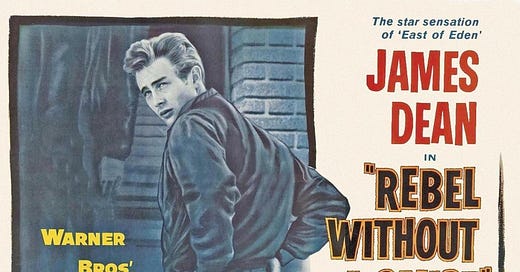



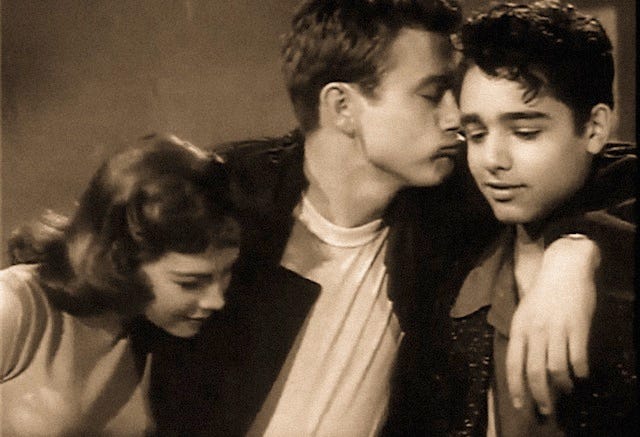
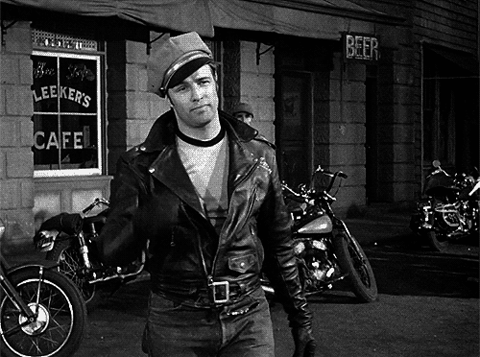
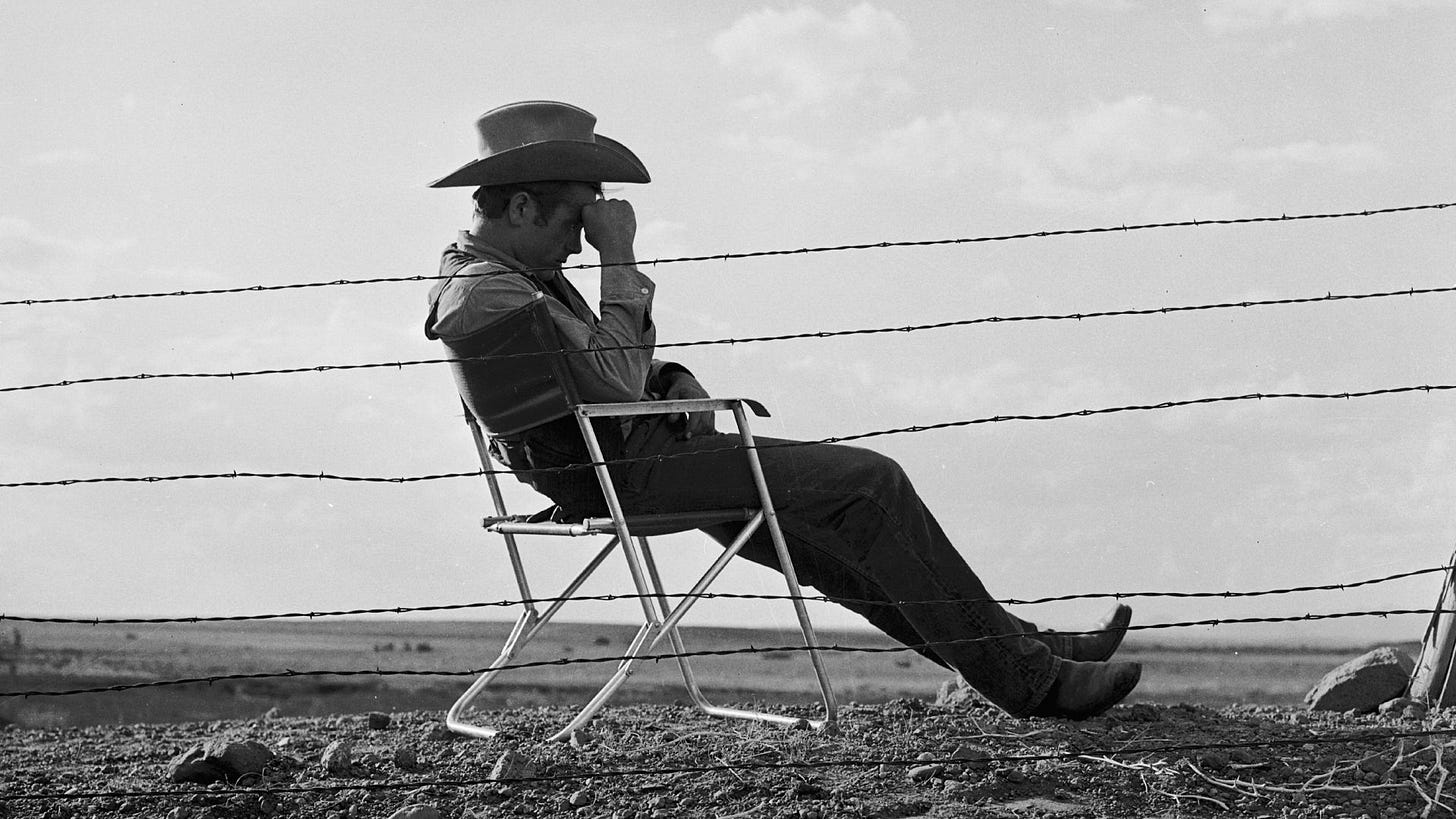

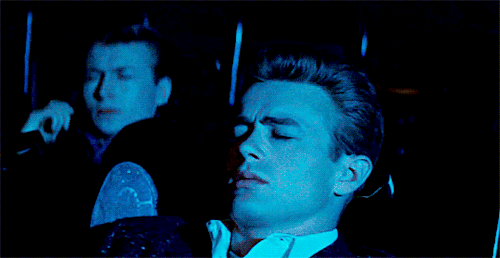
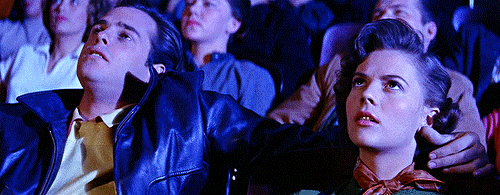
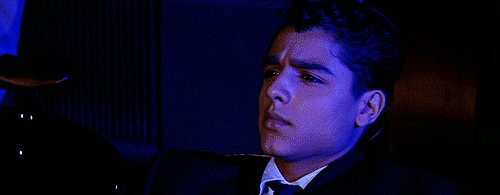
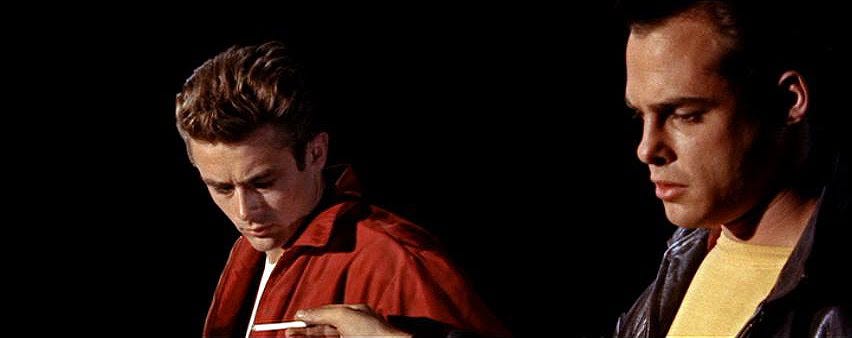
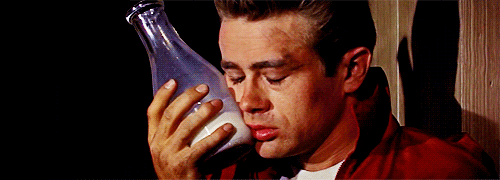

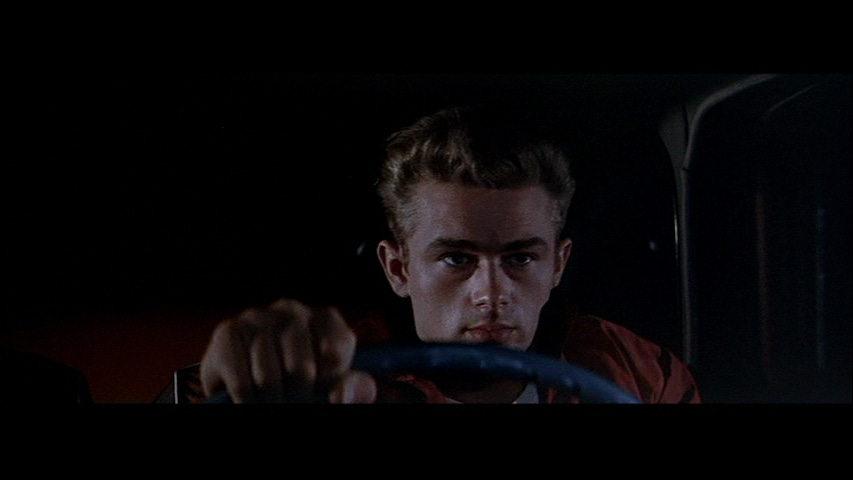
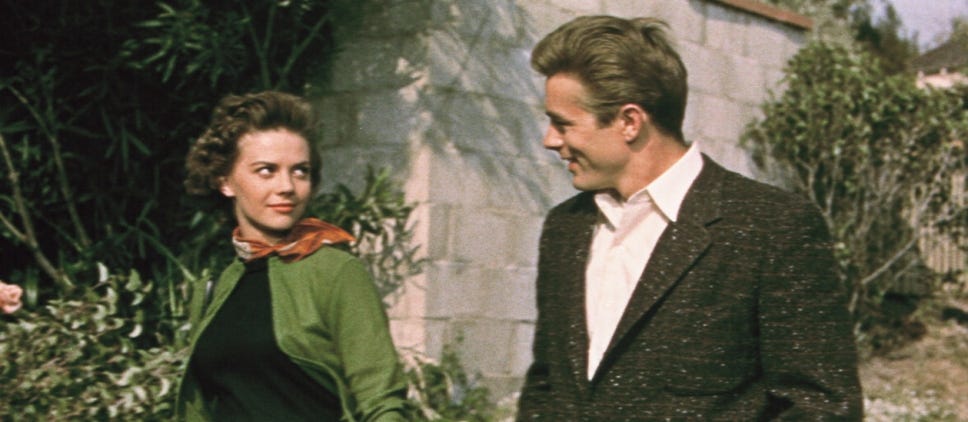



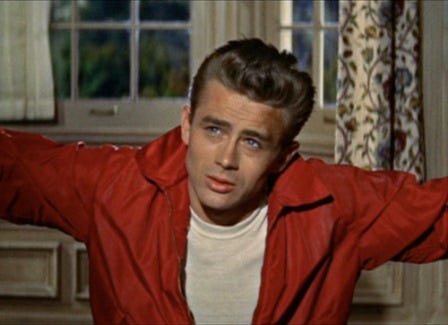
"There's one queasy moment as Rebel approaches the finish line where Jim's parents look at each other and finally laugh, as though burying the hatchet. This is the film’s only cop-out. It is a bone thrown to the conformity-ridden culture, to the worry-wart adults out there, saying, 'Hey, guys, you're not so bad after all, ya big lunks, we forgive you, we know you’re doing your best in a crazy world.'" This is analogous to the obligatory moment in all the cheapo 1950s rock'n'roll movies where we saw the grown-ups at the high school hop start to tap their feet to band, as if to say, "These kids and their wacky music - they're not so bad after all."
One historical irony, re: Lester Bangs comment about "How Much Is That Doggy in the Window?" It's actually an old sailor's song about prostitutes: "How much is that doggy in the window?/The one with the waggily tail/How much is that doggy in the window?/I do hope that doggy's for sale." Once you know the real subject, the lyrics are pretty unambiguous. So it's ironic that in such a sexually repressed decade, one in which this song in particular serves as a definitive example of that repression, the song itself is in fact about sexual decadence. (I count at least three #1 hits that are about prostitution: this one, "The House of the Rising Sun" and "Lady Marmalade." Funny how a culture founded in part by Puritans seems to feel the need to return to this topic from time to time.)
Thank you...
https://thenobbyworks.blogspot.com/2023/02/me-and-my-james-dean-memorial-stamp.html